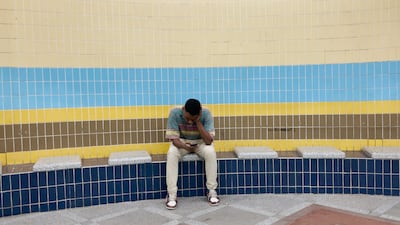In a music scene that has, over the past decade, become saturated with rap performers infusing their tracks with traditional Arab elements, a young performer is grabbing attention for bringing Nubian stylings to the foreground of Egyptian rap.
Called Nubi, after Nubia, a small Nile-side region in upper Egypt with its own unique local customs, traditions and culture, the musician emerged from the rap battle scene, which had been all the rage in the Egyptian capital before Covid-19 happened, bringing a nationwide moratorium on group events.
“In the beginning, no one really knew who I was. I would show up alone and leave alone,” Nubi tells The National. “But after a few weeks, some of the others began to notice me as the dark-skinned guy who wears a cap. Fast forward a few more weeks and people started messaging me and showing up just to see me rap. It was an interesting turn of events.”
The young artist first began his love affair with rap and hip-hop when he discovered old school names such as Tupac and Notorious B.I.G. (both of whose influence is quite clear in the artist’s earlier work), but quickly moved on to more modern, niche rap stylings which inevitably led him to some of Egypt’s most distinguished underground rappers.
He explains that he was quite taken with one artist in particular, the provocatively named Abyusif, who has been a fixture of the underground Egyptian rap scene for over a decade now, garnering in the process millions of listens and enough followers to constitute an Abyusif Army, as they call themselves.
Inspired by how local rap performers were blending quintessentially Egyptian experiences and ideas into a traditionally non-Egyptian genre, Nubi says he began to appreciate the importance of finding a unique voice in rap; he saw it as the only way to get noticed in the ever-growing local rap scene.
As he surveyed the budding music scene in Cairo, where he now resides, he noticed that some of the artists getting the most mainstream attention were the likes of Afroto and El Joker, who were incorporating traditional Egyptian percussion elements, such as tabla, into their beats, and by so doing tapping into the tastes of a wider Egyptian audience who grew up listening to those sounds.
A childhood spent in Nubia and the nearby Aswan, a Nile-side city with strong African influences in the local culture, gave him a unique insight into the musical stylings of his ancestral home, and he began to wonder how to bring that into the rap scene he was trying to break into.
It was around this time that the pandemic hit, which would turn out to be a somewhat fortuitous turn of events for Nubi, as it afforded him the time and mental capacity to go into a months-long monk-like study of traditional Nubian music.
Through extensive conversations with his parents Nubi began to understand his ancestral homeland more intimately and in turn began to think of ways to blend its culture with the more modern aspects of his identity, the ones which had been shaped by Cairo’s imposing concrete buildings and the testosterone-fuelled rap circles he frequented there.
“As I veered into Aswani music, there would be bits that would pop out and I would find myself thinking of how cool it would be to insert a shaabi element in one place, or an old school rap element in another,” he says.

He studied the music of Mohamed Mounir, in particular, one of Egypt’s most popular living singers, himself a native of Aswan. Nubi was inspired by the way that Mounir’s music transcended genre limitations and incorporated elements of jazz, reggae and soul.
“In the 1980s, Mounir did exactly what I am trying to do now when he blended traditional old school Egyptian vocal stylings with Nubian instrumentation,” explains the rapper. “He really brought Nubian culture to the foreground, and I want to do the same.”
A relatively short career has already seen Nubi catch the eye of some of Egyptian rap’s highest-calibre names, and this year, he managed to snag studio sessions with Afroto as well as a number of other prominent producers.
“Producers are the most important part. They have the technical know-how to bring an artist’s vision to life,” he says. “I feel really lucky to have worked with such big names on my latest release."

Starting earlier this year, Nubi released four singles from his upcoming LP Atr El Noum (Sleeper Train), a reference to an overnight train that is the most popular mode of transportation from Cairo to Aswan.
The tracks are instantly different from his earlier releases, and the references to Nubia and Aswan are undeniable. Aside from the fact that one of his tracks is entitled 3omdet el Nouba (the Mayor of Nubia), the lyrics of all four songs are delivered in the local Aswani dialect of Arabic, something done by Mohamed Mounir in many of his releases.
While the songs’ melodic hooks, delivered in 7oot el Ganoub (Whale of the South) by a traditional Nubian lyre, are broken up by fast-paced pugnacious rap that showcases the performer’s rhythmic prowess, their lyrical themes delve into what it’s like to grapple with the influences of two distinctly different cultures. Meanwhile, the beats are brought to life by the treble-heavy pops of Aswani tabla.
The production on all four tracks, which is distinctly more refined compared to Nubi’s releases from 2019 and 2020, is characterised by a rather heavy-handed use of autotune which he cleverly uses on Aswani-style melodies.
The four tracks, which garnered tens of thousands of listens on Spotify, have carved out a place for Nubi in the Egyptian rap pantheon.
He intends to release his first full-length record in 2022.

